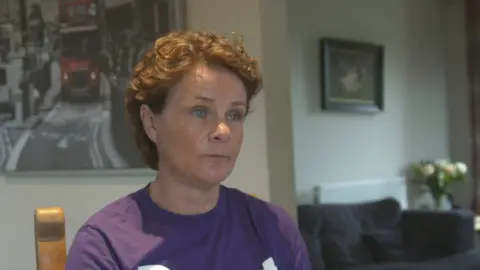'My daughter's anorexia was made worse by lockdown'
Rob says his 16-year-old daughter has been treated for anorexia for a year but she went on a "downward spiral" during lockdown.
His daughter - who we are not naming - had been receiving outpatient treatment as well as attending school and seeing friends.
The introduction of coronavirus lockdown restrictions brought all that to an end and within a month she was admitted to a specialist hospital for treatment.
The teenager was diagnosed with the eating disorder in May last year and she had been making a 50-mile round-trip with her father to get face-to-face support at least once a week.
But when the pandemic struck in March all support was moved online.
"The whole change in routine had a huge negative impact on the eating disorder," Rob told BBC Scotland's The Nine programme.
"Probably because there was no motivation to get to school because nobody was at school, so she's stuck at home just with her thoughts. The eating started tailing off again pretty quickly during lockdown."
'Very quickly downhill'
Rob says face-to-face contact with health professionals stopped and was replaced with video calls which his daughter did not engage with at all.
He says: "It's not the same as having that one-to-one interaction with the expert who can judge your mood, pitch the tone accordingly and think on their feet because you are in the room with them. It just didn't work and she hated it."
Rob says the changes to her routine and the isolation of not meeting friends led his daughter to go "very quickly downhill".
"I would have to say it probably wouldn't have been great but I don't think it would have been this bad without lockdown," he says.
On 28 April she was admitted to a specialist hospital for treatment.
Rob says: "The day she got admitted, that was a tough day.
"We just had to leave her at reception, we weren't even allowed in the building or in to the ward to help her get settled in. We just had to leave her with a stranger and a suitcase. We just had to turn our backs and leave her there.
"I stupidly thought that we'd still get to visit her."
But because of coronavirus lockdown restrictions, Rob went four weeks without being allowed to visit his daughter.
After four months in hospital, Rob's daughter is now home and he hopes her recovery can continue.

'Rising anxiety'
Dr Charlotte Oakley, from NHS Greater Glasgow and Clyde's Child and Adolescent Mental Health Services, says her team started to use video consultations for patients with eating disorders very quickly when lockdown was announced.
She adds that in Greater Glasgow those who were judged most at risk or who were struggling to engage were seen face-to-face.
Dr Oakley says that now the risks of covid have reduced, the key first two sessions with any patient will now be done in person.
The eating disorder specialist said the sudden change to patient's routines and structures as well as the rising anxiety across the country about the virus had created a "breeding ground" for difficult mental problems.
"For eating disorders we were really concerned because a lot of the drivers that young people have, the things that make them feel good, like being at school, achieving, being active and social, all those things were taken away," Dr Oakley says.

According to the charity Beat, lockdown has been a challenge for people with eating disorders such as anorexia, bulimia and binge eating disorders and demand for support has increased.
Beat's Emma Broadhurst says: "Eating disorders are really sneaky serious mental health illnesses. They thrive on isolation."
Long-lasting effects
Meanwhile, the Mental Welfare Commission for Scotland has unveiled a new paper looking at care, treatment and support for people with the conditions.
Interim executive director Claire Lamza said: "Eating disorders are a group of serious mental illnesses that are potentially life-threatening conditions.
"Anorexia nervosa has the highest mortality rate of any mental illness and can have a devastating lifelong impact."
The report's findings include families who said there was not enough support for them as they tried to manage the situation at home and that caring for someone with an eating disorder had "devastating and long-lasting effects" on the whole family.
It found inequalities of service across the country, including the availability of psychological therapies, with some people accessing support privately.
The paper also found concerns about the focus on body mass index (BMI) alone as a criteria for referral and as an indicator of recovery, with less attention paid to co-existing mental health conditions.
The Scottish government said: " We have been working closely with all health boards to plan the recovery of services across Scotland - this includes eating disorder services. We will be taking forward a review of eating disorder services."
